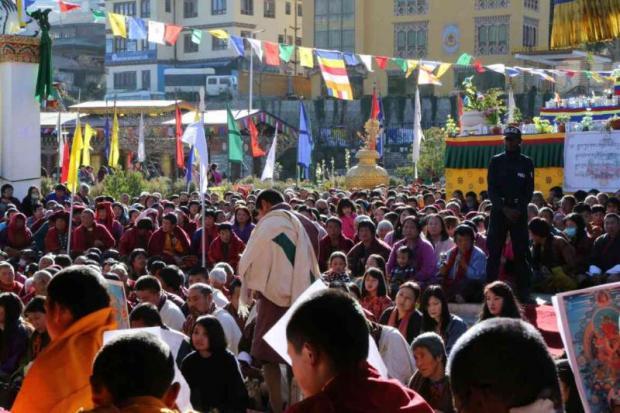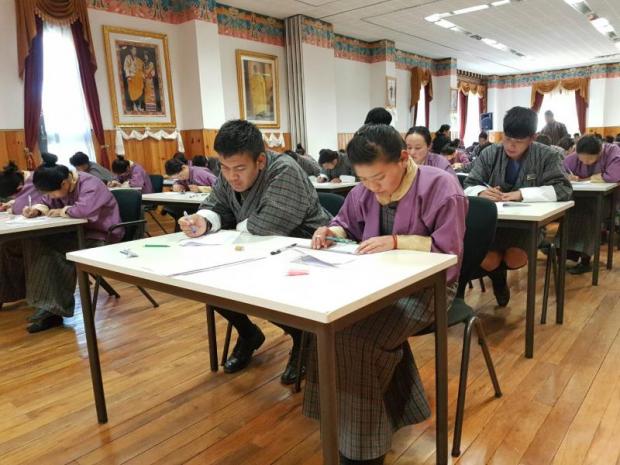As a Thai awkwardly dressed up in a gho, the Bhutanese traditional dress for men, wandering through Bhutan's capital city of Thimphu, I found myself amid interesting scenes where Indian pop culture seems to top the interest of young Bhutanese with Indian songs played in cafés and bars and Bollywood movies shown on television.
It is no surprise for the landlocked nation of countless scenic valleys to be culturally close to its southern neighbour, India. But when it comes to their bond with the reigning monarch, Bhutanese feel that they have something very much in common with people living much further away in Thailand. That allows many people in Bhutan to understand the period of grieving and mourning the Thai nation has been going through following the passing of King Rama IX on Oct 13 last year.
"We understand how Thais feel with the death of the Thai king. We've been sad and sorry to hear about [the passing of] the Thai king, even though our feelings cannot be compared to yours," said Phunso Namgay, a 28-year-old man.
While Bhutan's King Jigme Khesar Namgyel Wangchuck has become a popular figure among Thais, the late King Bhumibol is not little known among many Bhutanese.
"The Thai King Bhumibol was of similar character to the King of Bhutan. They both helped their people," he said.
A close bond between the royal families of the two countries helps him learn a lot about the late Thai king, he said.
"From what I have heard, I learned about what kind of king he was. He was always giving," said Phunso, a tour guide.
For a young democracy like Bhutan, which has been ruled under a constitutional monarchy since 2007, the nation owes much of its peace and progress to their previous and reigning kings. Before the reign of King Jigme Khesar Namgyel Wangchuck, other kings were also revered for their dedication to the well-being of the people, said Phunso.

Residents in Thimphu pray and mourn for King Bhumibol at the National Memorial Choeten held by the Bhutanese government last month.
"Our King Jigme is a father to the nation. The king is good and kindhearted, helping the poor," said 25-year-old Dr Chempay.
Like the late Thai king, King Jigme Khesar Namgyel Wangchuck has launched royal projects to improve people's well-being, made education free for all, provided land plots to the landless and offered his personal financial aid when the nation was struck by natural disasters, said Dr Chempay.
Given their strong bond with the monarch, Bhutanese were not surprised to know that their King Jigme and Queen Jetsun Pema went to Thailand to pay their respects within just a few days of the passing of King Bhumibol. They were the first foreign royals coming to pay their respects in person in the country.
At home, King Jigme and the rest of the royal family led the nation lighting 1,000 candles and praying for King Rama IX on Oct 13, the day of bereavement for Thais. He urged temples across the nation to light candles and hold praying ceremonies to pay respects to the late monarch.
When our Thai entourage, comprising government officials including Deputy Prime Minister Gen Tanasak Patimapragorn and Culture Minister Vira Rojpojchanarat and a group of journalists, made visits to a number of the country's sacred temples, we found rows of candles laid in front of an image of the late king inside.
At a memorial stupa, known as the National Memorial Choeten, hundreds of Bhutanese joined our group at a praying ceremony held by the Bhutanese government.
The legacy of King Bhumibol and his royal projects dedicated to Thai people recently gained much wider recognition in Bhutan as the country was the first chosen by the Thai government to host an exhibition to pay tribute to King Rama IX and his work.
Bhutan's Prime Minister Tshering Tobgay said the exhibition celebrates the noble achievements and contributions of King Rama IX for the benefits of not just the Thai people but humankind in general.
"His late majesty made an extraordinary contribution to human development," he said.
King Bhumibol's projects have brought immense innovations and benefits not only to his people but to the world, he added.
Held last month at VAST Bhutan, a contemporary art centre located on the bank of Thimphu River, the exhibition highlights King Bhumibol's key projects during the 70 years of his reign.

Bhutanese students take a final examination on the Thai language at the Royal Institute for Tourism and Hospitality in Thimphu, Bhutan.
The exhibition also features posters showing how Thais and Bhutanese mourned the late King. A TV screen next to the posters display a video of Thais paying their respects to King Bhumibol.
The strong bond between the Thai and Bhutanese monarchs is also highlighted in the event with photos of King Jigme visiting the royal projects of King Bhumibol.
Her Royal Highness Princess Maha Chakri Sirindhorn is also revered there as she initiated agricultural and education projects in schools in the country since 2012.
The close relationship between the two royal families helps cement bilateral relationships and paves the way for enhanced co-operation between the two nations in several areas, including trade, investment, agriculture, tourism and education. There are immense opportunities for the two countries to capitalise on the connection.
Potential for Thai trade and investment in Bhutan is immense, according to the Thai Ministry of Foreign Affairs, especially in the construction sector, hospitality, medical and health care services and filmmaking.
Even though the mountainous country does not have vast arable land for farming, its agricultural products are unique and organic. Given their market potential, Thailand's Ministry of Foreign Affairs has offered help from Thai volunteers who now work in the country on product packaging and marketing.
Bhutan has adopted a project similar to Thailand's One Tambon, One Product, or OTOP, called One Gewog (district), One Product, or OGOP.
A Thai volunteer said the project is in its early stages with a shop in Thimphu selling products from different regions in the country. Both countries are eyeing to boost co-operation on tourism under the theme "two countries, one destination", said Gen Tanasak.
The Royal Institute for Tourism and Hospitality in Thimphu has already adopted Thai as a mandatory subject for its students, signalling potential growth in the number of Thai tourists to the country.
If tourism co-operation materialises, it can benefit Thai tourists and facilitate their travel to Bhutan. Under current rules, in-bound tourists are required to pay a minimum of US$250 (8,900 baht) a day that covers accommodation, a tour guide, transport in the country, food and entry fees. The cost may be lower for Thais if talks succeed, said Gen Tanasak.
Bhutan, which has closely guarded its traditions and culture, has gradually opened itself up more to the world. Even though Indian and Korean pop culture may be appealing to the young generation, they still see the monarch as a unifying figure, the same as how Thais felt towards King Rama IX.
King Bhumibol will not only be remembered in his own country, but in Bhutan.
"He was a very good king. He brought political stability to Thailand whenever there was a political crisis in your country," said Dr Chempay.

